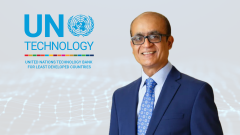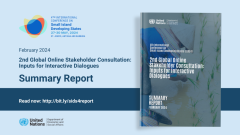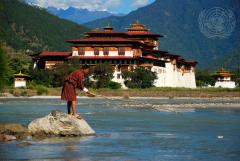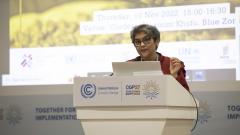- عربي
- 中文
- English
- Français
- Русский
- Español
Statement at the SDG Business Forum 2020: Catalyzing Finance and Investment for the Achievement of SDG 7
Statement by Ms. Fekitamoeloa Katoa‘Utoikamanu, High Representative for the Least Developed Countries, Landlocked Developing Countries and Small Island Developing States
23 September 2020
New York, USA
Excellencies,
Colleagues,
Ladies and gentlemen,
It is my pleasure to be here with you and participate in this important discussion on catalyzing finance and investment for the achievement of SDG 7.
The least developed countries, landlocked developing countries and small island developing states consists of 91 countries, with a total of 1.1 billion people. All three groups of countries face significant challenges across the three dimensions of SDG 7 - Access, Efficiency and Renewables.
Vulnerable countries are increasingly incorporating access to reliable, affordable and renewable energy in their national development plans.
Natural resource endowments including solar, hydro, geothermal and wind, provide these countries comparative advantages in achieving clean and accessible energy.
Despite the growth potential of their energy sector, LDCs, LLDCs and SIDS rarely benefit from large scale investments to the same extent as more prosperous developing countries.
For instance, public financial flows to developing countries in support of clean and renewable energy reached a total of US$ 21.4 billion in 2017. Only 12 per cent was directed to the least developed countries.
The success of delivering on SDG 7 hinges on a radical change of pace, and massive investment in the next few years.
The COVID-19 pandemic has highlighted the importance of robust and sustainable energy systems in managing risks and increasing resilience. The pandemic has had a disproportionate impact on communities that are energy poor.
Linked to the recovery, there is a growing global momentum for a clean energy transformation. Working together with donors and investors, vulnerable countries can leapfrog to renewable technologies.
Ladies and gentlemen,
To achieve the goal of energy transition, it is essential to create enabling environments that attract public and private renewable energy investments. Well-functioning institutions, supportive public finance policy and regulatory reforms help build credibility with investors.
Innovative partnerships are needed and I would like to briefly share with you an example of this kind of partnership that my office has been involved in in Malawi.
In 2019, UN-OHRLLS, together with the Government of Malawi, UNDP and Rocky Mountain Institute prepared a sustainable energy investment study for Malawi, a country that currently has a very low energy access rate. The study offered a roadmap for the sector to develop and seek 3 billion dollars of investment from a range of sources, to meet Malawi’s national policy goals in electricity and clean cooking, reaching universal energy access by 2030.
The study highlighted the following key messages:
- Even as private investment and blended finance grow, development finance will still continue to play a significant role.
- Being able to implement quick-win projects can unlock further commercial finance.
- There is a range of climate finance sources that are available to vulnerable countries, however, accessing these sources can represent a significant administrative burden.
- Capacity building and increased technical assistance remain critical, particularly to improve the pipeline of projects ready for investment.
- There are real and perceived risks that make it more difficult and expensive for vulnerable countries such as Malawi to access capital. Governments and development partners must work together to reduce risks through a range of measures.
While this study is specific to Malawi, it can also offer important lessons that other countries can benefit from.
Ladies and gentlemen,
Here at the UN, as we discuss how we can build back better after COVID 19, we see enormous opportunity in developing renewable energy projects in the least developed countries, landlocked developing countries and small island developing states. Catalyzing finance is a key to unlocking this potential.
The upcoming High-level Dialogue on Energy, and the Fifth UN conference for Least developed countries, to be held in Doha Qatar in January 2022, provide important platforms to further scale up action.
I thank you for your attention.





